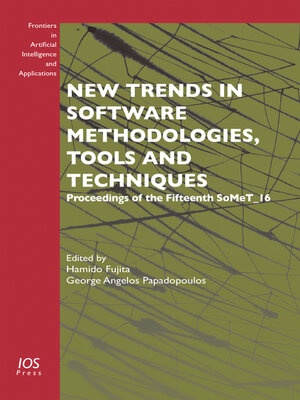New Trends in Software Methodologies, Tools and Techniques
ebook ∣ Proceedings of the Fifteenth SoMeT_16 · Frontiers in Artificial Intelligence and Applications
By George Angelos Papadopoulos

Sign up to save your library
With an OverDrive account, you can save your favorite libraries for at-a-glance information about availability. Find out more about OverDrive accounts.
Find this title in Libby, the library reading app by OverDrive.



Search for a digital library with this title
Title found at these libraries:
| Library Name | Distance |
|---|---|
| Loading... |
Software has become an essential enabler for science and the economy. Not only does it create new markets and the possibility of a more reliable, flexible and robust society, it also empowers our exploration of the world in ever increasing depth. However software often falls short of our expectations, with current methodologies, tools and techniques remaining insufficiently robust and reliable for constantly changing and evolving needs. This book presents papers from the 15th International Conference on New Trends in Intelligent Software Methodology Tools and Techniques (SoMeT 16), held in Larnaca, Cyprus, in September 2016. The SoMeT conference focuses on exploring the innovations, controversies and challenges facing the software engineering community, bringing together theory and experience to propose and evaluate solutions to software engineering problems with an emphasis on human-centric software methodologies, end-user development techniques, and emotional reasoning, for an optimally harmonized performance between the design tool and the user. The book is divided into six chapters covering the following areas: decision support systems; software methodologies and tools; requirement engineering; software for biomedicine and bioinformatics; software engineering models, and formal techniques for software representation; and intelligent software development and social networking. The book explores new trends and theories which illuminate the direction of developments in the field, and will be of interest to all in the software science community.







